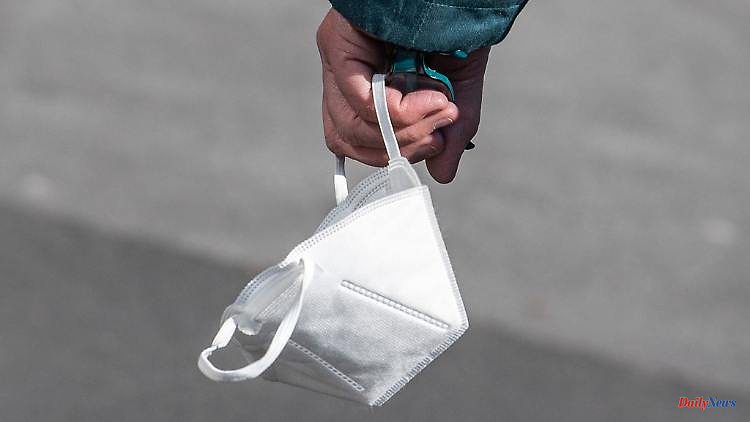The mask requirement indoors will return if the corona situation worsens. The federal and state governments agree on that. There should only be exceptions for newly vaccinated people - a controversial issue at the meeting of health ministers. Strong criticism of the actions of the federal government can be heard from Bavaria.
In the event of a tense corona situation in autumn and winter, citizens must be prepared for the return to the obligation to wear masks indoors. At a conference of health ministers (GMK) of the federal and state governments, however, clear differences became clear about exceptions provided by the federal government for newly vaccinated people.
Federal Minister of Health Karl Lauterbach (SPD) said after the consultation: “It has been made clear that wearing a mask indoors should be the rule in a tense pandemic situation.” Several countries had previously criticized planned exceptions. This is about the plan to exempt people from wearing masks in restaurants or at cultural and sporting events if their vaccination is not older than three months.
Lauterbach said: "It should only be possible to deviate from this in exceptional cases." This makes the emergency rule even safer. "A freshly vaccinated person has a relatively low risk of infection even if they don't wear a mask." Bavaria's Health Minister Klaus Holetschek called on Lauterbach to remove the "questionable exceptions" to the mask requirement for newly vaccinated and recovered people from the law. A three-month vaccination interval contradicts the current recommendations of the Standing Vaccination Commission.
According to the GMK Chair and Saxony-Anhalt Health Minister Petra Grimm-Benne, the states have pointed out that the mask exceptions are difficult to control and implement. The Rhineland-Palatinate State Secretary for Health Denis Alt (SPD) specified that it was unclear how the measures could be controlled and implemented. "The federal government assumes that it can do this by reprogramming the Corona warning app," said Alt. "The federal states do not see this as the final answer to the problem." Not everyone uses the Corona warning app or even has a smartphone. There would have to be other avenues.
However, Grimm-Benne described the protection concept for the fall presented by Lauterbach and Justice Minister Marco Buschmann as a good basis for providing the federal states with a "tool box". "On the one hand, nationwide measures such as the obligation to wear masks in air and long-distance traffic offer guidelines for coping with the autumn wave," said Grimm-Benne. "At the same time, the federal states are given the power to order further protective measures." The SPD politician also insisted that schools and daycare centers should remain open.
According to the ideas of Lauterbach and Buschmann, a mask requirement on buses, trains and planes should continue to apply nationwide, as well as a mask and test requirement in hospitals and care facilities. The countries should decide for themselves whether they also require masks in public interiors. Lauterbach said the states had made important suggestions. He welcomes the desire for a nationwide approach. Lauterbach called on the federal states to use the possibilities of the planned infection protection law.
Holetschek demanded that Lauterbach change key points in the draft - even in the face of possible resistance from the ranks of the FDP. "Unfortunately, the communication from the federal government has been disastrous so far," criticized the CSU politician. Most recently, FDP members of the Bundestag had rejected the draft negotiated by the FDP Minister of Justice in its current form. Lower Saxony's Prime Minister Stephan Weil also sees a need for discussion as to whether newly vaccinated people can be exempted from the mask requirement. "I don't think that's a wise arrangement," said the SPD politician to the "Weser-Kurier".
Holetschek called for clarity from the Standing Vaccination Commission (STIKO) about "who can be vaccinated, with which vaccine this is possible and how long the protection lasts". STIKO boss Thomas Mertens should personally comment on this in the GMK. The CSU politician also called for the institution-related vaccination requirement for employees of clinics and nursing homes to be phased out at the end of the year. "This is important for the already burdened facilities."
The Robert Koch Institute (RKI) gave the nationwide seven-day incidence on Tuesday at 381.5. Experts have been assuming for some time that there will be a large number of cases not recorded by the RKI - mainly because not all infected people have a PCR test done. Within one day, 170 people died from Corona.












